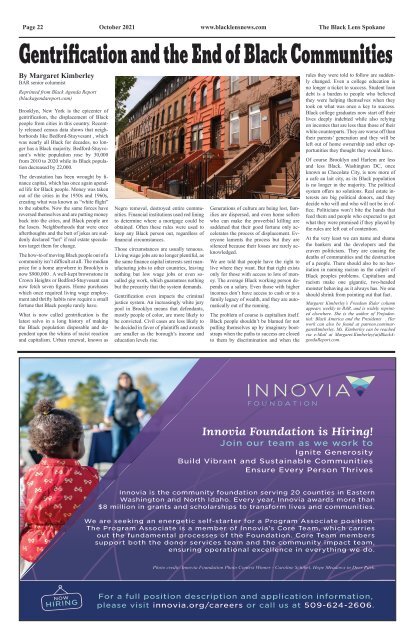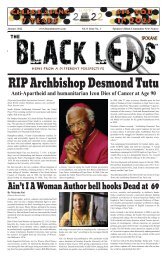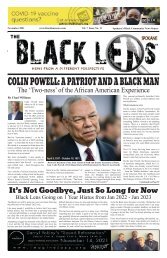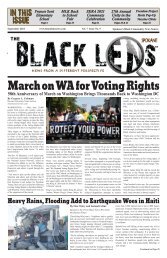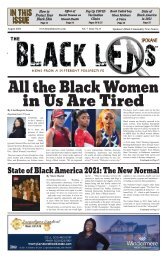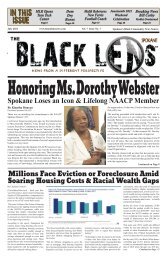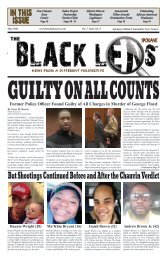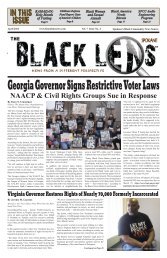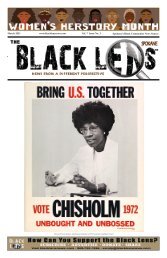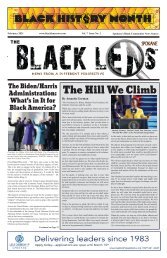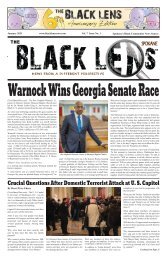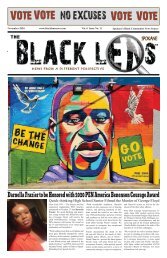Black Lens - October 2021
The Black Lens in an independent , community newspaper, published monthly and based in Spokane, WA, that covers then news, people, information and issues that are of importance to the Black community.
The Black Lens in an independent , community newspaper, published monthly and based in Spokane, WA, that covers then news, people, information and issues that are of importance to the Black community.
You also want an ePaper? Increase the reach of your titles
YUMPU automatically turns print PDFs into web optimized ePapers that Google loves.
Page 22<br />
<strong>October</strong> <strong>2021</strong><br />
www.blacklensnews.com<br />
The <strong>Black</strong> <strong>Lens</strong> Spokane<br />
Gentrification and the End of <strong>Black</strong> Communities<br />
By Margaret Kimberley<br />
BAR senior columnist<br />
Reprinted from <strong>Black</strong> Agenda Report<br />
(blackagendareport.com)<br />
Brooklyn, New York is the epicenter of<br />
gentrification, the displacement of <strong>Black</strong><br />
people from cities in this country. Recently<br />
released census data shows that neighborhoods<br />
like Bedford-Stuyvesant , which<br />
was nearly all <strong>Black</strong> for decades, no longer<br />
has a <strong>Black</strong> majority. Bedford-Stuyvesant’s<br />
white population rose by 30,000<br />
from 2010 to 2020 while its <strong>Black</strong> population<br />
decreased by 22,000.<br />
The devastation has been wrought by finance<br />
capital, which has once again upended<br />
life for <strong>Black</strong> people. Money was taken<br />
out of the cities in the 1950s and 1960s,<br />
creating what was known as “white flight”<br />
to the suburbs. Now the same forces have<br />
reversed themselves and are putting money<br />
back into the cities, and <strong>Black</strong> people are<br />
the losers. Neighborhoods that were once<br />
afterthoughts and the butt of jokes are suddenly<br />
declared “hot” if real estate speculators<br />
target them for change.<br />
The how-to of moving <strong>Black</strong> people out of a<br />
community isn’t difficult at all. The median<br />
price for a home anywhere in Brooklyn is<br />
now $900,000 . A well-kept brownstone in<br />
Crown Heights or Bedford-Stuyvesant can<br />
now fetch seven figures. Home purchases<br />
which once required living wage employment<br />
and thrifty habits now require a small<br />
fortune that <strong>Black</strong> people rarely have.<br />
What is now called gentrification is the<br />
latest salvo in a long history of making<br />
the <strong>Black</strong> population disposable and dependent<br />
upon the whims of racist reaction<br />
and capitalism. Urban renewal, known as<br />
Negro removal, destroyed entire communities.<br />
Financial institutions used red lining<br />
to determine where a mortgage could be<br />
obtained. Often these rules were used to<br />
keep any <strong>Black</strong> person out, regardless of<br />
financial circumstances.<br />
Those circumstances are usually tenuous.<br />
Living wage jobs are no longer plentiful, as<br />
the same finance capital interests sent manufacturing<br />
jobs to other countries, leaving<br />
nothing but low wage jobs or even socalled<br />
gig work, which guarantees nothing<br />
but the precarity that the system demands.<br />
Gentrification even impacts the criminal<br />
justice system. An increasingly white jury<br />
pool in Brooklyn means that defendants,<br />
mostly people of color, are more likely to<br />
be convicted. Civil cases are less likely to<br />
be decided in favor of plaintiffs and awards<br />
are smaller as the borough’s income and<br />
education levels rise.<br />
Generations of culture are being lost, families<br />
are dispersed, and even home sellers<br />
who can make the proverbial killing are<br />
saddened that their good fortune only accelerates<br />
the process of displacement. Everyone<br />
laments the process but they are<br />
silenced because their losses are rarely acknowledged.<br />
We are told that people have the right to<br />
live where they want. But that right exists<br />
only for those with access to lots of money.<br />
The average <strong>Black</strong> working person depends<br />
on a salary. Even those with higher<br />
incomes don’t have access to cash or to a<br />
family legacy of wealth, and they are automatically<br />
out of the running.<br />
The problem of course is capitalism itself.<br />
<strong>Black</strong> people shouldn’t be blamed for not<br />
pulling themselves up by imaginary bootstraps<br />
when the paths to success are closed<br />
to them by discrimination and when the<br />
rules they were told to follow are suddenly<br />
changed. Even a college education is<br />
no longer a ticket to success. Student loan<br />
debt is a burden to people who believed<br />
they were helping themselves when they<br />
took on what was once a key to success.<br />
<strong>Black</strong> college graduates now start off their<br />
lives deeply indebted while also relying<br />
on incomes that are less than those of their<br />
white counterparts. They are worse off than<br />
their parents’ generation and they will be<br />
left out of home ownership and other opportunities<br />
they thought they would have.<br />
Of course Brooklyn and Harlem are less<br />
and less <strong>Black</strong>. Washington DC, once<br />
known as Chocolate City, is now more of<br />
a cafe au lait city, as its <strong>Black</strong> population<br />
is no longer in the majority. The political<br />
system offers no solutions. Real estate interests<br />
are big political donors, and they<br />
decide who will and who will not be in office.<br />
Politicians won’t bite the hands that<br />
feed them and people who expected to get<br />
what they were promised if they played by<br />
the rules are left out of contention.<br />
At the very least we can name and shame<br />
the bankers and the developers and the<br />
craven politicians. They are causing the<br />
deaths of communities and the destruction<br />
of a people. There should also be no hesitation<br />
in naming racism as the culprit of<br />
<strong>Black</strong> peoples problems. Capitalism and<br />
racism make one gigantic, two-headed<br />
monster behaving as it always has. No one<br />
should shrink from pointing out that fact.<br />
Margaret Kimberley’s Freedom Rider column<br />
appears weekly in BAR, and is widely reprinted<br />
elsewhere. She is the author of Prejudential:<br />
<strong>Black</strong> America and the Presidents . Her<br />
work can also be found at patreon.com/margaretkimberley.<br />
Ms. Kimberley can be reached<br />
via e-Mail at Margaret.Kimberley(at)<strong>Black</strong>AgendaReport.com.


